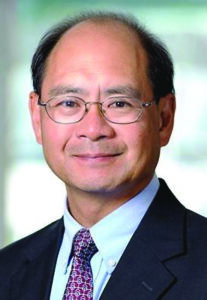By Tom Jarvis
In light of the New Hampshire Bar Association’s 150th anniversary year, this month’s Fictional Lawyers column* is centered around past NHBA presidents. In 150 years, the Bar has had many presidents, 38 of which are currently living. Being president of the Bar Association is an important job and it is the highest role of leadership that the NHBA has to offer. A Bar president is the chief volunteer and spokesperson for the Association.
Three past presidents have already given their responses in previous Fictional Lawyers columns (Ed Philpot and Peter Hutchins in the November 2022 issue, and Jack Middleton in the March 2023 issue), but here is what five other past presidents had to say about their favorites:

Hon. John T. Broderick, Jr., Chief Justice (Ret), NH Supreme Court
NHBA President from 1990 to 1991
“Showing my age, I confess that I watched the Perry Mason TV program almost every week when I was young. I was fascinated by jury trials, the preparation needed to succeed in court, and by the power and simple genius of the trial process itself. It was mesmerizing to me. It probably didn’t hurt that Perry Mason won every trial he had, either. But because of my exposure to that show (I had no lawyers in my family or in my world), I decided while in the 7th grade to become a trial lawyer, and I never wavered from that goal. It was the best decision I ever made. During her confirmation hearing Justice Sotomayor was asked how she became interested in the law as a career. She mentioned watching Perry Mason when she was young, too. I felt in pretty good company. It certainly didn’t hurt her. Perry Mason was tireless, principled, patient, civil, and fiercely skilled in cross examining witnesses and connecting to juries. He seemed the perfect lawyer.
I think Perry Mason would do just fine in a New Hampshire courtroom today. Bombast, theatrics, and cutting corners have never been the calling card of the best lawyers here, so his style and preparation would play well before New Hampshire trial judges and juries, and he would have been a feared but respected opponent for any member of the bar. My guess is that he would not have been a big fan of technology, however, because unless it is used well it would interfere with his uncanny ability to personally connect to juries.”

Bruce W. Felmly, McLane Middleton
NHBA President from 1995 to 1996
“There are several movie lawyers on my mind, but the best single scene, perhaps the best closing argument ever in the movies, is Jake Brigance’s closing to the jury in the racially charged murder trial in A Time to Kill. Matthew McConaughey’s request to the southern jury, ‘…now I want all of you to close your eyes,’ as he graphically describes the gang rape and attempted murder of the black defendant’s young daughter is powerful. And he ends the closing to the jurors, all eyes still closed, with, ‘Can you see her? Can you see her? Now, imagine that little girl is white.’ It is a brilliant portrayal of combatting implicit bias and empowerment of a jury.
Few trial lawyers have the circumstances to build or generate such suspense, but the closing teaches strong lessons of pace, timing, and even drama which can illuminate an argument. And such drama does sometimes really happen in jury trials. And how would Matthew’s daring approach be received in a NH courtroom? It might vary a bit lawyer to lawyer, juror to juror, but I would hope someone would recognize the scene and the actor and give back his trademark response: ‘Alright, Alright, Alright.’”

Richard Y. Uchida, Colby College
NHBA President from 2005 to 2006
“Anthony Petrocelli on the show Petrocelli. He was one of the first lawyers portrayed as the unconventional, gritty little guy fighting against the system and its injustices. Until then, most lawyers were portrayed on TV and movies as very polished – suits (usually only in trial for him), ties (his was always loose), driving expensive cars (he drove a beat-up pickup truck), living in beautiful homes (he and his wife lived in a trailer), practicing in big cities (he was Harvard-educated, from Boston, and practiced in the fictional town of San Remo, Arizona), and were part of the upper crust of society. They never looked like the type that rolled up their sleeves and fought the good fight for people who had been marginalized for one reason or another. He didn’t look like a lawyer, he didn’t act like a lawyer (as we thought of them then), and he didn’t talk like a lawyer – and one came to realize there was no fixed stereotype for lawyers who successfully champion the cause of equal justice for all.
Based on him, I became convinced there was a place in the legal profession for someone who didn’t otherwise look the part. In NH, he would do better than most. I think he would be admired for his devotion to the cause of equal justice, his strong sense of ethics and moral responsibility, his admiration of the law, and his down-to-earth style of practicing law.”

Eleanor Wm. Dahar, Dahar Law Firm
NHBA President from 2007 to 2008
“Atticus Finch, from To Kill a Mockingbird. He is my favorite because, like Atticus, as an attorney, you often have a client with a difficult/challenging issue(s) in need of representation by an attorney. Atticus would fare well in court today since our justice system, whether through jury or bench trial, is intact and is fair and blind; however, I am not sure how he would handle trial by Webex or Zoom.”

David W. McGrath, Sheehan, Phinney, Bass & Green
NHBA President from 2018 to 2019
“I really like Paul Newman’s portrayal of lawyer Frank Galvin in The Verdict. There is something compelling about Galvin’s innate talent obscured by years of neglect; his pursuit of justice and redemption; and his triumph on behalf of his client despite long odds. Although the courtroom scenes are mostly unrealistic (Galvin mentions not a single piece of evidence in his closing), they are riveting because he is genuine and relatable. The same could be said for Viola Davis’ brilliant portrayal of fictional lawyer Annalise Keating in How to Get Away with Murder. Like Galvin, Keating is unrealistically light on evidence and heavy on humanity in her closing, but she connects with the jury, reminding us that little is as universally appealing as humility and empathy.”
If you’d like to share your favorite fictional lawyer in this column, contact NHBA Publications Editor Tom Jarvis at tjarvis@nhbar.org. Please include your favorite fictional lawyer, why they are your favorite, and your opinion on how they would fare in a present-day New Hampshire courtroom.
*Editor’s Note: I received so many responses from past presidents – thank you all so much – that I decided to split this into to two parts (this issue and next issue). Next month will feature five more past NHBA presidents and their favorite fictional lawyers.
